As the Rohingya crisis in the sub-continent continues to escalate, the big powers in the region are wrestling to occupy the front seats in finding a concrete and sustainable solution. The grave situation in Myanmar has forced more than 600,000 Rohingyas to cross over to Bangladesh within less than six months. About 1.1 million Rohingya Muslims have been denied citizenship in Myanmar and have been victims of the ruthless ethnic-cleansing campaign.
Strategic Stance of India-China on Rohingya Crisis
In this scenario, India and China have time and again adopted different strategic stances on how to ensure that Myanmar and Bangladesh are pacified and that the humanitarian crisis comes to an end.
During a brief visit by Chinese Foreign Minister Wang Yi on 23 November, Bangladesh and Myanmar agreed to begin repatriation of the refugees. This was followed by a series of high-level meetings between the Chinese President Xi Jinping and Myanmar’s army chief Senior Gen Min Aung Hlaing in Beijing, and separately with Daw Aung San Suu Kyi, the country’s civilian leader.
India, meanwhile, has yet to set out a concrete position on the crisis. In a recent visit to Myanmar, Prime Minister Narendra Modi did not utter a word with regards to the Rohingya crisis – even though the geo-political climate had taken such a crucial turn.
Beijing’s Fluctuating Relationship with Myanmar
On the other hand, Beijing has had a fluctuating relationship with the Myanmar military as well as with the various ethnic organisations active in the region. Until the early 2000s, Beijing maintained a robust relationship with the military government and avoided acting as a power-broker or mediator with the opposition.
In stark contrast to recent developments, in early 2011, as a major stakeholder in Kachin state, Beijing remained quite reticent on the ethnic conflicts which erupted owing to the military’s offensive.
However, with Naypyidaw’s attempt to open up to the rest of the world and the resulting increase in competition from western countries to maintain energy security in Myanmar, Beijing has been compelled to reconsider its approach to the ethnic issues.
In recent times, China has taken greater interest in acting as a mediator to resolve the ethnic conflicts, however, maintaining a balanced approach towards the military in Myanmar. The Rohingya crisis has come to China as an opportunity to reassert its strategic presence and build its economic strength in the region.
Strategic Neutrality on India’s Part
In the immediate aftermath of the three-point action plan, Bangladesh and Myanmar signed a non-binding, bilateral repatriation agreement – although this appears a dead letter as long as Myanmar doesn’t erect adequate infrastructure and an affable environment to swiftly accommodate the refugees.
India, by contrast, has maintained strategic neutrality and has recently provided more humanitarian aid with a view to ensuring the refugees return to Myanmar.
While the Supreme Court of India is hearing a petition for repatriation of Rohingya settlers in the border states, the Indian government has gone ahead with an MoU with the Myanmar government. The agreement was signed by India’s Foreign Secretary Subrahmanyam Jaishankar during a visit to Myanmar, with the country’s Deputy Minister for Social Welfare, Relief and Resettlement U Soe Aung.
Efforts by India and China to Assert Superiority
Both India and China are seeking greater opportunities to extend their strategic presence as well as to establish themselves as regional leaders, by engaging in the process of mediation.
Both states have sought to accommodate Myanmar, whether through humanitarian aid or aiding strategic planning to resolve the Rohingya crisis. In both cases, however, the underlying challenges are not being addressed.
Does Myanmar have the capacity to accommodate the refugees peacefully? Do the other actors involved in the crisis have a major role to play and how are they affecting the bilateral and mutilateral relationships in which Myanmar and Bangladesh are enmeshed?
In assuming their strategic positions, India and China have paid less attention to ensuring Myanmar develops an environment conducive to the refugees returning. Yet, unless this were to be ensured, the Rohingyas would again be traumatised and marginalised.
At the crux of a peaceful resolution to this conflict lies addressing its root causes –including both the economic and political factors.
The Rohingyas have been alienated from the public domain, lacking access to formal citizenship. Without securing their political rights and alleviating their socio-economic situation, the refugee crisis will only be further aggravated.
(The writer is associated with the Centre for Strategic Studies, Observer Research Foundation. She can be reached @baisali_mohanty. This is an opinion piece and the views expressed above are the author’s own. The Quint neither endorses nor is responsible for the same.)
